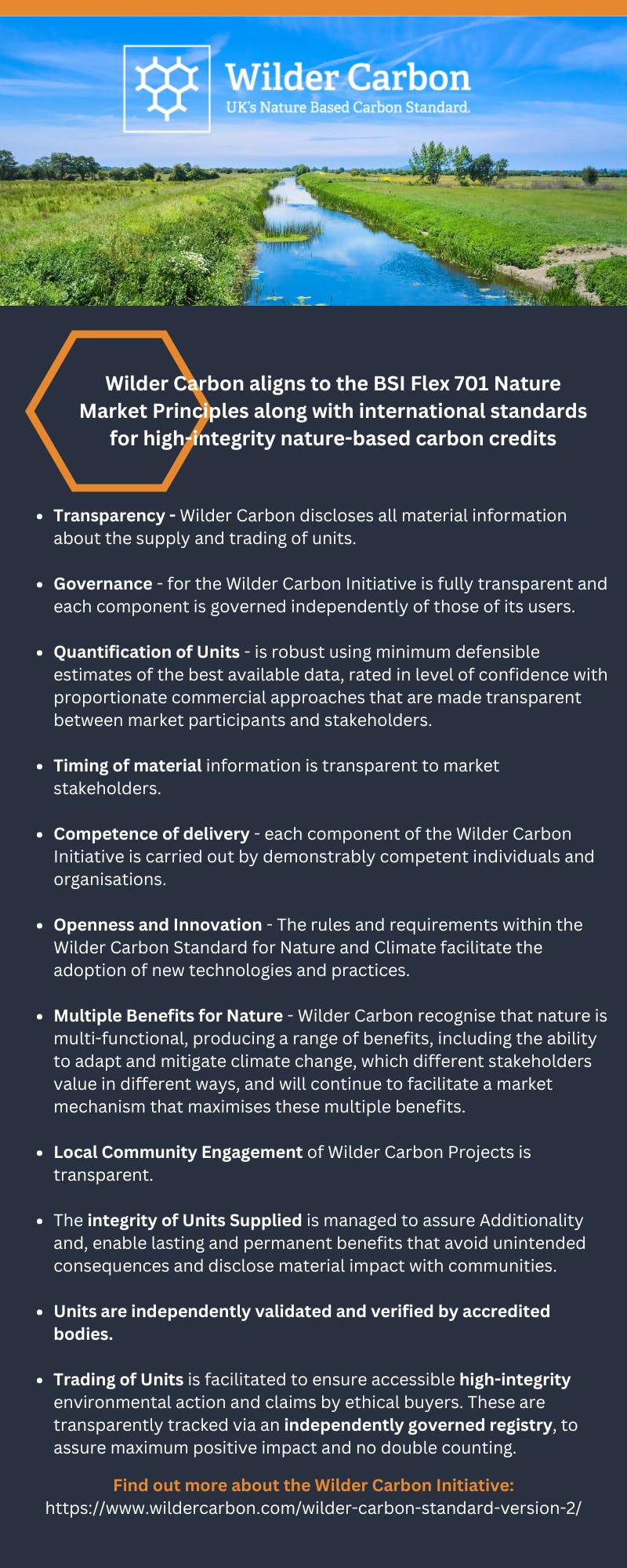
BSI Nature Market Principles – Will they drive meaningful and ambitious nature restoration?

Sarah Brownlie Program Director
Nature is in steep decline, yet globally, human impact continues to contribute to loss of nature and rapid global warming. The UK Government has set targets to halt species decline, deliver net zero ambitions and boost nature recovery - stimulating at least £500m of private investment to deliver this.
We must, therefore, incentivise the quantification and delivery of simultaneous ecosystem benefits on UK land. Ensuring these benefits are useable in both offsetting and impact accounting against targets will enable corporates to attribute meaningful action, whilst establishing the revenue streams needed to attract and fund this target investment.
The recent National Parks Campaign health check report revealed that only 6% of National Parks land mass is recorded as being in good health for nature. So whilst nature market mechanisms fundamentally raise capital for nature restoration, it is vital that they are also underpinned by the need to assure *functional diversity for them to meaningfully count towards UK plc targets, and make a real difference to our natural support system.
* Functional diversity refers to those components of biodiversity that influence how an ecosystem operates or functions.
Although anecdotally DEFRA have been supportive of innovation in the development of nature markets (e.g. through their support of the NEIRF), the recent Nature Markets Framework update continues to place bias towards schemes which the UK Government are already financially invested in, that don’t necessarily provide all the tools to provide functional diversity at scale, and so there is an urgent need to provide confidence in a diversified market space.
Helen Edmunson, Director of the Green Team at DEFRA states that: ‘the BSI work looks to provide consistency across codes, ensuring nature markets deliver real and lasting benefits. This will improve trust and increase participation in these markets, scaling investment and growth’.
What we think of the BSI Nature Market Principles
Wilder Carbon welcomes the publication of the proposed Nature Market Principles set out within the BSI Flex 701 – v1.0 - Nature markets – Overarching principles and framework.
It is encouraging that through their work with the BSI, DEFRA is working to ensure integrity in nature markets with a view to supporting the much bigger toolbox of solutions required in driving forward ambitious nature recovery.
Wilder Carbon largely support the Nature Market Principles and consider that most principles clearly set out how they are to be applied to nature markets, employing a thorough yet pragmatic approach and enabling innovation within these nascent markets whilst also ensuring robust approaches, by requiring schemes to transparently disclose material scheme information.
This transparency and robustness will provide much needed confidence for all market participants to help stimulate flow of revenues to fund investment and position us to drive nature restoration ambitiously.
Particularly of note for Wilder Carbon, is the support for innovative approaches and technologies, flexibility in exploring stacking of multiple benefits, and acknowledgement of the associated climate impact considerations required to enable lasting benefits.
However, with consideration of this, and the context above on the state of nature outlining the urgent need to assure functional diversity, we would urge BSI and DEFRA to strengthen both the BSI Flex, along with the supporting strategic policy and Nature Markets Framework on the requirements to prioritise *minimum intervention management approaches that assure functional diversity, and to revise Government targets and initiatives to support a much more diverse range of environmental habitats within nature markets as detailed below.
*Wilder Carbon Minimum Intervention Approach Framework.
Recommendations to improve the principles
Wilder Carbon have responded to the open consultation on the BSI Flex 701, with key recommendations as follows:
Subsequent standards
On the potential to develop subsequent standards - Wilder Carbon challenge that the overarching framework BSI have produced provides sufficient program requirements (should it be supported by a formal assessment framework and process) to avoid the need for subsequent standards for carbon, biodiversity, other quantified benefits etc. to detail specific requirements for the delivery of different types of nature-based projects or trading in different nature markets (e.g. for CO2e or biodiversity).
Multiple Benefits
Wilder Carbon support the inclusion of this principle within the standard, however, we would urge BSI/DEFRA to strengthen this with consideration of the context above, to prioritise natural regeneration of habitats to assure an underpinning requirement of functional diversity for any nature-based project for its deliverable benefits, in order to meaningfully count towards UK plc targets, with consideration of the *evidence that is building which demonstrates added resilience as a result of this approach, along with increased benefits from restoring natural processes.
Lasting and Permanent Benefits
Wilder Carbon welcome the acknowledgement of the need to design and adapt management approaches to consider the impacts and risks of climate change as per *Note 2. We would urge DEFRA to consider this in their emerging Nature Markets policy and prioritise natural regeneration of habitats to assure underpinning requirement of functional biodiversity for any nature-based project for its deliverable benefits to meaningfully count towards UK plc targets with consideration of the evidence that is building which demonstrates added resilience along with increased benefits from restoring natural processes.
Furthermore – we would urge DEFRA to revise the Nature Markets Framework to emphasise a much broader range of habitats as part of nature recovery targets, to ensure functional biodiversity for maximum benefits and resilience of their contribution towards UK plc targets. And that supporting mechanisms such as the woodland carbon guarantee extend to these wider habitats.
*NOTE 2 Climate change impacts which manifest steadily over time can be anticipated and accounted for in management of the delivery of nature units over their lifetimes. For example, where climate change results in increased fire risk for a supply area, this should be included in management of the supply area; not doing so would be “neglect” that failed to make the delivery of units lasting.
Purchasing Units
Wilder Carbon applaud the inclusion of principles for the use of units. Wilder Carbon recommend that in keeping with the tone of the BSI Flex, clarity should be provided of where the responsibility lies to evidence this i.e. Sellers are responsible for evidencing that units shall be purchased as part of a strategy to achieve independently defined levels of acceptable environmental impacts.
Wilder Carbon recommend providing clarity that action in line with the mitigation hierarchy may not need to be taken chronologically i.e. once strategy is in place to adhere to a proportionate mitigation hierarchy, purchases can take place to secure the supply of units they will need for the future. Also, in line with our recommendation above, clarity should be provided on where the responsibility lies to evidence this i.e. ‘Sellers are responsible for evidencing’ that buyers are making use of a mitigation hierarchy, in which purchasing units as compensation is one part of a broader plan that prioritises internal mitigation activities.
Registries
Wilder Carbon view the requirements under the registries principle as reasonable and akin with international standards. We would however encourage BSI/DEFRA to strengthen this requirement to demonstrate leadership in integrity, and linking to principle for purchasing units, that registries should also track details of buyer mitigation activity which could support enforcement of the mitigation hierarchy activities in parallel to businesses investing in nature markets for example:
- a) if BNG registries tracked the onsite mitigation of developments it could provide further transparency to ensure onsite BNG is managed and monitored to the same extent as receptor sites to ensure over deliver of Biodiversity Net Gain.
- b) similarly in carbon, that internal mitigation activities for the buyers of carbon credits are transparent and their performance against them communicated over time to demonstrate high integrity application of carbon credits and overall delivery of Net Zero targets.
Trading Processes
Ethical Buyers and Suppliers - Wilder Carbon support the inclusion of this principle within the standard. This could be strengthened by including requirements for disclosure, linked to principle for registries.
Stacking rules – Wilder Carbon applaud the pragmatic approach to facilitating stacking of the sale of multiple benefits. This is clearly a complex and innovative approach and would benefit from the inclusion of more detailed examples, even case studies, to help market participants navigate this approach. Wilder Carbon will be exploring how to apply these stacking principles in order to provide greater transparency on how this can work in practice.
So how does Wilder Carbon stack up?
We have requested early assessment by BSI’s recommended conformity assessment bodies, of Wilder Carbon against the BSI Flex 701 Nature Markets Principles to further demonstrate our high integrity approach.
But for now, read more about how we align in our image here or below and watch this space for further news as we pursue assessment under international standards.
